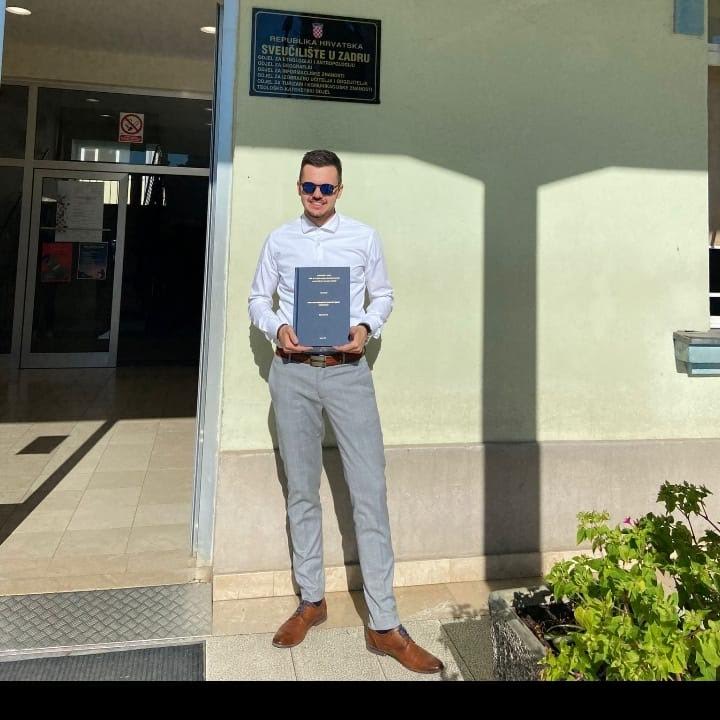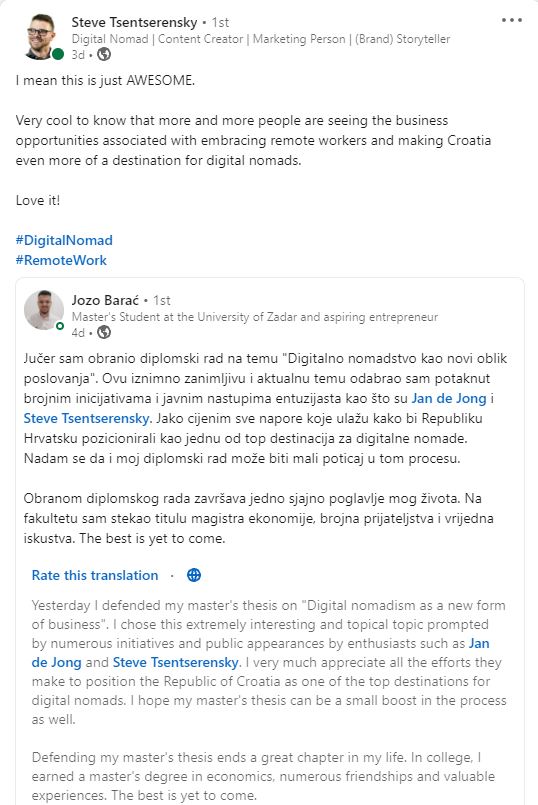October 18, 2021 - Changing the mindset of the next generation is one of the key benefits for Croatia with the digital nomad opportunity - a topic which is now the subject of an academic thesis.
One of my favourite moments at the excellent Dubrovnik Digital Nomads-in-Residence programme back in April was having a coffee with one of the local attendees on the first day of the design thinking workshop which helped create the strategy and roadmap forward for Dubrovnik's digital nomad journey.
"This has been mindblowing," she said. "A completely new way of living, and of thinking. And I have already decided that I am going to trade in my current way of life for the digital nomad revolution."
The world of work is changing, and the era of remote work is here. I have been thoroughly enjoying meeting lots of progressive people over the last year, many of whom are foreigners who have chosen to combine their online job with the enviable Croatian lifestyle - a winning combination. And the more people who come with this new way of working, with their fresh ideas, the more they will inspire a new way of thinking in the younger generation in Croatia, many of whom choose emigration over trying to make a life here.
And if seems that interest is trickling down to the world of academia.
This LinkedIn post from digital permit holder, Steve Tsentserensky, made me smile. Steve has been doing sterling work promoting Croatia, from speaking at conferences and writing viral articles for CNBC on the subject, to producing outstanding photos and videos as he explores the country. Great to see that both he and Jan are a cause for inspiration.
I decided to reach out to Jozo Barac about his choice of thesis, thinking it must be the first thesis in Croatia on the subject. It apparently was the second, as he informed me:
Through a detailed search, I found that so far only one Master thesis in 2020 has been written on the topic of digital nomadism in Croatia. In my opinion, this paper was written as a fairly general account of digital nomadism. Therefore, I wanted to write a thesis that will clearly show what digital nomadism is, what are the most common occupations, what is needed to develop a destination for digital nomads and how Croatia is positioned in the context of such a destination. Also, I conducted research on young people of different study orientations. In this research, I measured their attitudes and motivation and, through three different hypotheses, statistically tested whether there were significant differences in their attitudes and motivation for digital nomadism.

Inspired by the likes of Steve and Jan, Jozo dived into his research into this new world of opportunity. He told me:
I believe that Croatia meets three basic prerequisites for the development of such destinations, namely fast and stable Internet, climate conditions and acceptable living costs. Also, we are a safe destination and have many cultural and natural attractions. Our highways are good, while the railways are very bad. I believe that by increasing the number of digital nomads in Croatia, new airlines will be introduced. Furthermore, within this destination development, numerous entrepreneurial opportunities can be realized. Some of these opportunities are the opening of coworking and coliving spaces and the creation of various gastronomic and adrenaline tours for digital nomads. I absolutely support the recent opening of the valley for digital nomads in Zadar and I believe that there will be more and more such projects.
Congratulations to Jozo on his graduation, and good luck on your entrepreneurial journey. You can find a summary of Jozo's thesis below, and you can connect with him on LinkedIn if you want to know more.
Digital nomadism as a new form of business
Travel has been an indispensable part of human life since the beginning of the development of all civilizations. The main motives for the trip were usually a change of environment, rest, recreation, meeting new cultures and people. Today, people most often travel during the holidays which they use to rest and recover from stressful everyday life. However, for many, traveling in these quantities is not enough and they are looking for ways to travel more.
One way to travel more is definitely digital nomadism. It is a term that encompasses traveling and getting to know different cultures around the world while simultaneously earning a living with the inevitable mediation of technology and internet connection. In this paper, the introduction highlights the goals, content and methodology of the research. Also, the problem and the subject of research are defined.
The second chapter defines the concept of digital nomadism and the holistic approach to the study of this concept. Such an approach encompasses the frameworks of digital nomadism as an economic activity or model, as a cultural phenomenon and as a technologically enabled form of work. It presents the basic characteristics, positive and negative sides and the most common occupations practiced by digital nomads. Some of these professions are social media marketing expert, SEO expert and e-retailer of digital products. Also, the basic legislative frameworks around the world concerning the topic of this paper are presented. The Republic of Croatia should be highlighted as a country that has clearly defined the conditions of stay of digital nomads on its territory by voting on the Foreigners Act, which has been valid since 1.1.2021.
The third chapter presents the conditions for the development of destinations for digital nomads. The basic preconditions for the development of such destinations are fast and stable internet connection, climatic conditions and low cost of living. In this chapter, the Republic of Croatia is placed in the global context of such destinations and can be positioned as one of the most desirable destinations for digital nomads. Also, the basic possibilities and limitations of the development of such destinations are listed. In the fourth chapter, the research methodology is presented and a survey of 120 respondents was conducted through an online questionnaire. Of the three hypotheses set, the first and third hypotheses were accepted, while the second hypothesis was rejected. Based on the entire paper, basic conclusions were reached on the overall topic of digital nomadism, destination development in this context, and a number of research conclusions and recommendations for future research.

For more news and features on digital nomads in Croatia, follow the dedicated TCN section.



